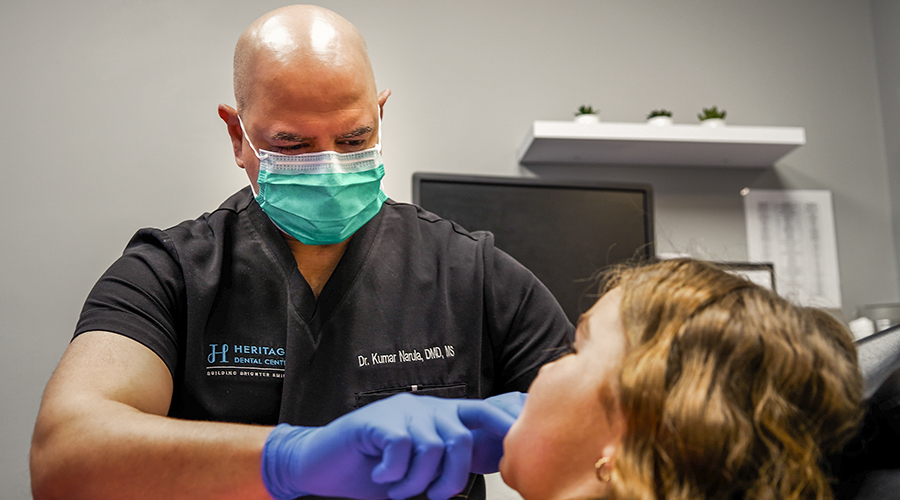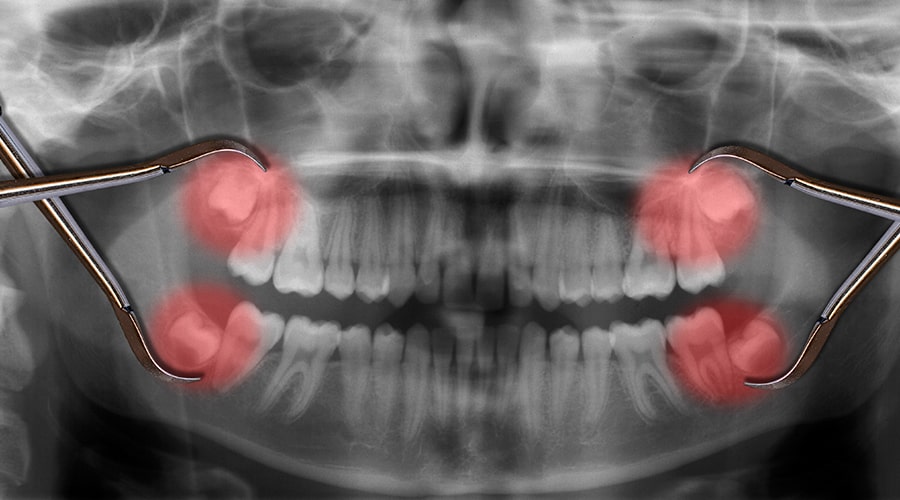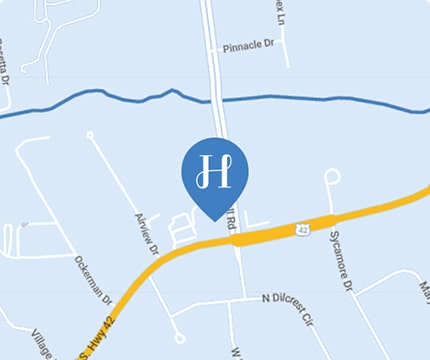
Safe & Comfortable Care Tooth Extractions in Northern Kentucky
Heritage Dental Center in Northern Kentucky specializes in tooth removal and dental extractions, including wisdom teeth removal and other extraction procedures. Our experienced oral surgeons provide expert care for damaged or impacted teeth, offering lasting, reliable solutions to restore your smile. Schedule a consultation with our trusted tooth extraction oral surgeon today!

4 Convenient Locations for Tooth Removal in Northern Kentucky

Common Reasons for Tooth Extractions
Tooth extractions are a common dental procedure and may be necessary for various reasons. Third molars, also known as wisdom teeth, are often the primary teeth requiring extraction due to complications such as impaction, infection or overcrowding. Additionally, other teeth may need to be extracted if they are severely damaged by decay, trauma or disease and cannot be restored through root canal therapy or other treatments. Other common reasons for tooth extractions include periodontal disease that has caused extensive damage to the tooth and surrounding bone, or the need to make room for orthodontic treatments to properly align the teeth.
- Impacted tooth – tooth is trapped beneath bone or gums and not emerging properly
- Crowding or small mouth – emerging teeth may cause other teeth to shift or crack due to lack of space
- Decay or infection – when a tooth is affected by extreme decay or infection that cannot be corrected with filling or root canal treatment, it may require extraction
Types of Extractions
- Simple Extractions: Simple extractions are performed on teeth that are fully erupted and visible in the mouth. The dentist or oral surgeon loosens the tooth using forceps and then removes it. This procedure is generally quick and performed under local anesthesia.
- Surgical Extractions: When a tooth is not visible, impacted, or broken below the gum line, a surgical extraction is required. This may involve making an incision in the gum tissue and, in some cases, removing surrounding bone to fully extract the tooth. Surgical extractions are typically performed with local anesthesia, sedation or general anesthesia depending on the complexity.
Who Is a Good Candidate for Dental Extractions
- Severely Decayed or Damaged Teeth: Teeth that can't be restored by other treatments.
- Impacted Wisdom Teeth: Wisdom teeth causing pain or infection.
- Overcrowded Teeth: Teeth needing removal for orthodontic purposes.
- Advanced Gum Disease: Loose teeth from severe gum issues.
- Infection or Abscess: Teeth with infections that can't be treated.
- Failed Root Canals: Teeth that no longer respond to root canal therapy.


Expert Wisdom Teeth Removal in Northern Kentucky
Wisdom teeth removal is a common oral surgery procedure typically recommended when third molars are impacted, causing pain, infection or other dental complications. These teeth often lack sufficient space to emerge properly, resulting in crowding or misalignment of adjacent teeth. Untreated wisdom teeth can potentially cause cysts or damage to the jawbone. Early removal, usually during the late teens or early twenties, can prevent more serious dental issues and facilitate a quicker, smoother recovery.
Important Things to Know: Post-Extraction Care
- Transport: Arrange for a friend or family member to drive you home after the procedure.
- Rest: Rest with your head propped on a pillow to minimize bleeding.
- Gauze: Change the gauze as needed, replacing it when it becomes soaked.
- Pain Management: Follow instructions for pain medication and ice packs to manage discomfort and swelling.
- Bleeding: If bleeding persists beyond 24 hours, contact our office immediately.
- Diet: Stick to soft foods for the first few days, and avoid smoking or using straws to prevent complications.
What to Expect During Tooth Removal
Tooth removal is a common procedure performed by oral surgeons to address a variety of dental issues, such as impacted or decayed teeth. Here's what you can expect during the tooth extraction process:
- Consultation and Examination: Before the procedure, your oral surgeon will conduct an exam, possibly with X-rays, to assess the condition of the tooth and surrounding area, determining the best approach for extraction.
- Anesthesia and Numbing: To provide a pain-free procedure, local anesthesia or sedation will be administered to numb the area around the tooth or provide complete relaxation during the extraction.
- Tooth Removal: Once the area is numb, the tooth is gently removed using specialized tools. If the tooth is impacted, an incision may be made in the gum. The tooth may be broken into smaller pieces for easier removal.
- Post-Extraction Care: After the tooth is removed, the extraction site will be cleaned, and stitches may be placed if necessary to promote healing. You’ll receive aftercare instructions, including pain management and how to care for the extraction site.
- Follow-Up Appointment: A follow-up may be scheduled to check for proper healing, remove stitches (if applicable) and address any concerns you may have. This is also an opportunity to check for potential complications like infection or dry socket.
Dental Extraction FAQ
What are the risks of tooth removal?
Risks include infection, bleeding, dry socket or damage to nearby teeth or nerves, but proper aftercare reduces these risks.
Can I drive home after an extraction?
No. After your extraction, you will need to be driven home by a friend or family member. You will require rest, but lie with your head propped on a pillow to prevent prolonged bleeding.
How long is the recovery time?
Recovery typically takes 1 to 2 weeks, though full healing may take several months, especially with additional procedures. If bleeding continues beyond 24 hours, contact our office immediately.
Will I need antibiotics?
Antibiotics may be prescribed, particularly if there’s an infection or surgical complexity.
What if I experience severe pain or swelling?
Mild pain and swelling are normal, but severe or persistent symptoms may indicate complications and should be evaluated by your oral surgeon.
5-Star Dental Extractions
Join our satisfied patients!

Plan Your Visit
New Patients Welcome!
Experience exceptional dental care at one of our 4 Northern Kentucky locations. We warmly welcome new patients into our practice! Contact us today.


